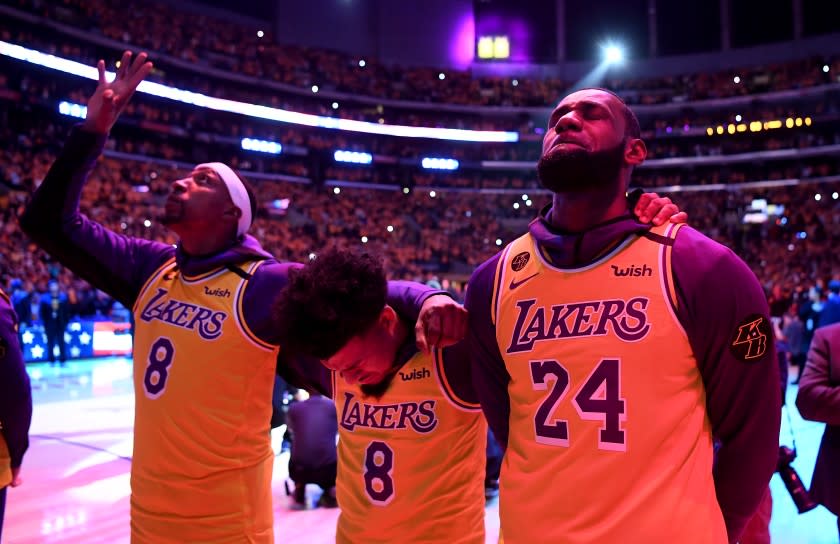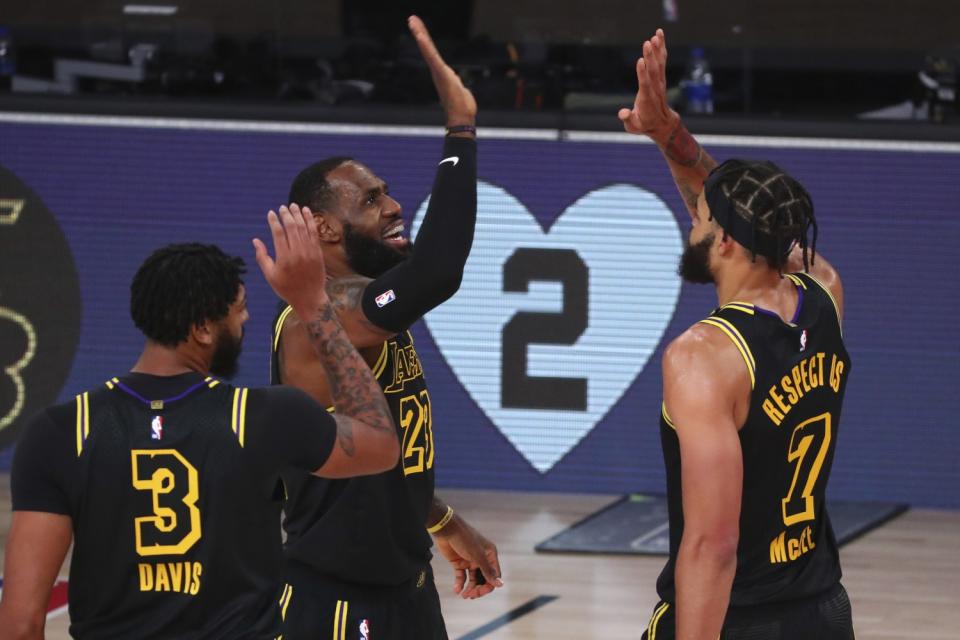One year after Kobe Bryant's death, the Lakers continue to honor his memory

- Oops!Something went wrong.Please try again later.
The Lakers, reeling from the unthinkable loss of a franchise icon, his daughter and seven of his friends, gathered as a group and vowed to carry the pain with them all season.
Kobe Bryant’s death wouldn’t be forgotten, not by them, and his legacy would be channeled every time the players gathered on the court. They’d try to transform pain into appreciation.
“Mamba on three ... One, two, three — Mamba!”
They broke their huddles with it even as their hearts ached in the aftermath of the Jan. 26 helicopter crash. They said it when the NBA season hung together by threads in the earliest days of the coronavirus outbreak.
When the team reconvened inside the NBA bubble in Florida, the world a drastically different place than it was five months earlier, they broke huddles the same way. And when the team fought through a 95-day gantlet on their way to a championship, those words never stopped passing through their lips.
Because of that, because of Bryant and his impact, the Lakers weren’t going to stop now.
“There’s a lot of things that die in this world,” LeBron James said. “But legends never die and he’s exactly that. . . . It’s all about representing that.”
One year since Bryant’s death, the Lakers still celebrate his life. Players wear tributes. Some have tattoos. They wear his sneakers, find echoes of his jersey numbers 8 and 24 in scores, stats, all over the arena. They shout his name after the biggest shots of their careers.
And they win no matter the circumstances, fighting through a global pandemic and severe isolation to capture glory.
What could be a better basketball tribute to Kobe Bryant than that?
“We want to represent what he stood for. That’s the most important thing for us,” coach Frank Vogel said three days after Bryant’s death. “We want to represent what he stood for.”
In the immediate aftermath of the accident, it wasn’t clear how the Lakers would go on.
The organization, much more of a mom-and-pop shop than people realize, was devastated by Bryant’s death; so many people still with the team have a firsthand perspective on Bryant’s transformation from a brash rookie to NBA legend over the course of two decades.
One day after the crash, the NBA postponed a scheduled game with the Clippers. The Lakers, who as an organization were silent after the crash, finally acknowledged it in a brief statement.
The next day, players, coaches and staff gathered for lunch, the floor open for people to share memories, to vent about regrets and to plot how’d they move forward, most notably with James telling teammates that he has broad shoulders for a reason. He would carry them if they needed it.
The team practiced Wednesday and Thursday, Vogel trying to ease some of the tension by bringing the team across the street for an impromptu outdoor workout that devolved into a football scrimmage. And the hope was that a return to game action Friday would be the next step for the team’s recovery.
“This whole week has been really good for our group to just pull through it together and heal together,” Vogel said before the Lakers played Portland.
But Staples Center didn't host a basketball game that night. It hosted a citywide funeral. Players wore Bryant jerseys over their warmups. Grammy-winning artist Usher sang “Amazing Grace” to start a 24-minute tribute. A moment of silence lasted 24.2 seconds for Bryant and his daughter Gianna. Their jerseys were draped over the last courtside seats they occupied.
And before they could play, James delivered a eulogy.
“I know at some point, we will have a memorial for Kobe. But I look at this, I look at this as a celebration tonight,” James told the world. “This is a celebration of the 20 years of the blood, the sweat, the tears, the broken-down body, the getting up, the sitting down, the everything — the countless hours, the determination to be as great as he could be.”
The Lakers lost — by eight.
“That was one of the hardest games I've ever played because of how heavy it was, how emotional it was. . . . Playing in that game was sort of an out-of-body experience,” said Danny Green, a Lakers guard at the time. “I wasn't there in the game. Like, the ball felt weird. It was weird playing that game. It was tough, man.”
The Lakers couldn’t escape the shadow of Bryant’s death, his memory being honored when the team visited new arenas, the All-Star game reimagining its format and dedicating the weekend in Chicago largely in Bryant’s honor.
The NBA renamed its All-Star game most valuable player award after Bryant, and the Basketball Hall of Fame announced his induction.
“You could definitely feel Bean’s presence from the start,” James said after the All-Star game. “He was definitely here.”
Bryant’s presence never faded even when the NBA was forced into an extended pause because of the pandemic. It was present when players reconvened in the bubble.
“Ever since the tragedy happened, we had a mindset that this is bigger than, you know, ourselves. And we had that approach,” Anthony Davis remembered nearly a year later. “And there were so many signs in the bubble that he was there with us.”
Players, coaches and staff wore shoes with Bryant’s logo on them, a subtle tribute. Other reminders were more surreal.
Wearing their black “Mamba” jerseys, the Lakers led 24-8 while playing Portland in the first round of the playoffs on Aug. 24 — 8/24. Later, Davis hit a game-winning shot as the team wore those same uniforms, screaming “Kobe!” in celebration while he was mobbed by teammates.
Vogel called it a “Mamba shot.”
“It's just a lot of things that happened that we didn't expect to happen. And it just happened,” Davis remembered. “It showed us that it was destined for us to win a championship for him.”
They talked about winning for Bryant, with general manager Rob Pelinka even addressing the team before Game 5 of the NBA Finals — a potential title clincher — to talk about his former client and close friend. The message was heavy and included a tribute video, catching some in the locker room off guard.

The team, wearing the Mamba jerseys, lost Game 5 before closing out the Heat in Game 6, completing their dance with what felt like destiny.
“Hope I made you proud my brother,” James posted on Instagram.
The wounds remain within the Lakers a year later; people who were close to Bryant are still reluctant to talk about what happened Jan. 26, 2020.
“I’m not comfortable talking about it. I’m sorry. Still to this day, I have never really talked about it,” Lakers center Marc Gasol said.
Quinn Cook, who idolized Bryant, declined to speak about Bryant’s death and legacy. James has done it reluctantly. The pain maybe isn’t as acute, but it persists.
“I try not to put myself back in that headspace because it’s just too dark for not only myself but for our organization and for everyone that’s involved in it,” James said. “As the leader of the ballclub, it was my job and my responsibility to take it all on and represent our team with the most strength that I could at that point and time. For the purple and gold, for Laker Nation, it was my job to take that, take that responsibility.”
On the night the Lakers returned to the court following the deaths of Kobe and Gianna Bryant, James stood under the spotlight in the middle of the floor, flanked by floral arrangements.
“In the words of Kobe Bryant, ‘Mamba out,’” he said. “But in the words of us, ‘Not forgotten.’”
They’ve lived up to their promise, to continue to honor Bryant no matter the hurt.
“As we approach his one-year anniversary, it saddens our hearts to actually come to the realization that he’s gone,” Davis said. “I know I still have trouble with it.”
But he and his teammates still gather, hands together, to remember that pain, to turn that into inspiration and to honor the memory of someone who touched the lives of so many.
They count to three — and ”Mamba.”
This story originally appeared in Los Angeles Times.

